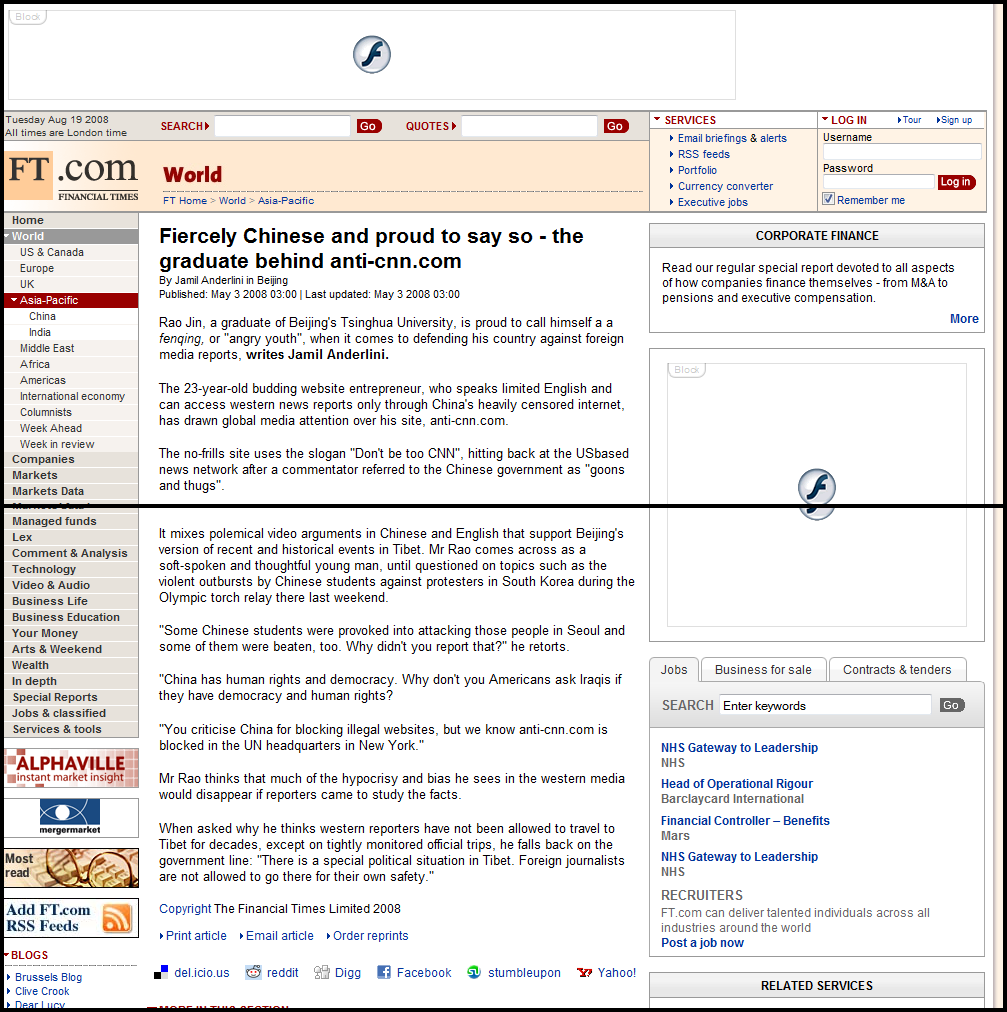|
|
【标题】Fiercely Chinese and proud to say so - the graduate behind Anti-CNN.com自豪的中国愤青:anti-cnn.com背后的大学毕业生
【来源】http://www.ft.com/cms/s/0/388af316-18aa-11dd-8c92-0000779fd2ac.html?nclick_check=1
【翻译】dakelv
【声明】本文翻译仅限Anti-CNN使用,谢绝转载。
【鸣谢】多谢小雨点网友指出了译文中的几处拼写错误!
【原文】
Fiercely Chinese and proud to say so - the graduate behind anti-cnn.comBy Jamil Anderlini in Beijing
Published: May 3 2008 03:00 | Last updated: May 3 2008 03:00
Rao Jin, a graduate of Beijing's Tsinghua University, is proud to call himself a a fenqing, or "angry youth", when it comes to defending his country against foreign media reports, writes Jamil Anderlini.
The23-year-old budding website entrepreneur, who speaks limited Englishand can access western news reports only through China's heavilycensored internet, has drawn global media attention over his site,anti-cnn.com.
The no-frills site uses the slogan "Don't be tooCNN", hitting back at the USbased news network after a commentatorreferred to the Chinese government as "goons and thugs".
It mixespolemical video arguments in Chinese and English that support Beijing'sversion of recent and historical events in Tibet. Mr Rao comes acrossas a soft-spoken and thoughtful young man, until questioned on topicssuch as the violent outbursts by Chinese students against protesters inSouth Korea during the Olympic torch relay there last weekend.
"SomeChinese students were provoked into attacking those people in Seoul andsome of them were beaten, too. Why didn't you report that?" he retorts.
"China has human rights and democracy. Why don't you Americans ask Iraqis if they have democracy and human rights?
"You criticise China for blocking illegal websites, but we know anti-cnn.com is blocked in the UN headquarters in New York."
MrRao thinks that much of the hypocrisy and bias he sees in the westernmedia would disappear if reporters came to study the facts.
Whenasked why he thinks western reporters have not been allowed to travelto Tibet for decades, except on tightly monitored official trips, hefalls back on the government line: "There is a special politicalsituation in Tibet. Foreign journalists are not allowed to go there fortheir own safety."
【原文截图】

【翻译】
自豪的中国愤青:anti-cnn.com背后的大学毕业生
当他面对西方媒体的报道为自己的国家辩护时,饶谨,一个北京清华大学的毕业生,非常自豪地称自己为“愤青”,或者“愤怒青年”,Jamil Anderlini 写道。
这个23岁的崭露头角的网络创业者,不太怎么会说英语,在中国戒备森严的网络了解西方的新闻报道。因为他的anti-cnn.com网站,饶谨引起了环球媒体的注意。
这个朴实无华的网站的口号是“不要太CNN”,这个口号是对那个美国新闻网络评论员称中国政府是“呆子和暴徒”的反击。
这个网站里有支持北京对西藏近代历史事件观点的中英文辩论视频。饶先生是一个声音柔和,有思想的年轻人,直到被问及上周火炬传递时在首尔的中国学生和抗议者之间的冲突这样的问题。
“那些首尔的中国学生是先受到挑衅然后才攻击那些人的,而且他们中也有受伤的。你们为什么不报道这个?”他反问道。
“中国有人权和民主。你们美国人为什么不问一下伊拉克人他们有没有民主和人权?”
“你们批评中国屏蔽不法网站,但是我们知道anti-cnn.com在纽约的联合国总部屏蔽掉了。”
饶先生认为,如果记者认真了解一下事实的话,大部分西方媒体的虚伪和偏见就会消失。
当被问及为什么西方记者几十年来一直不被允许到西藏去,除了严密监视的官方旅行之外时,他的回答和政府的说法是一致的:“西藏有特殊的政治现状。不让外国记者去是为了他们的安全。”
[ 本帖最后由 dakelv 于 2008-9-8 15:52 编辑 ] |
评分
-
1
查看全部评分
-
|